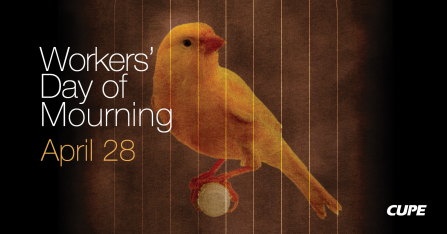
The Workers’ Day of Mourning was created by CUPE members more than 40 years ago to remember those who lost their lives on the job and to inspire workers to fight to prevent further tragedies.
Work must be healthy and safe.
COVID-19 pandemic emergency measures are over, but workers still have the right to be protected from the dangers of respiratory illnesses in their work. It’s not just COVID-19. Infections can damage workers’ health and put their lives at risk.
Workers are facing increased pressure to “get back to normal” while still trying to recover from the pandemic’s intense work pace and emotional, physical, and personal demands. The impacts on mental health continue to emerge, impacts most workplaces aren’t equipped to deal with it.
Workers must keep pushing their employers to prevent exposure to communicable illnesses and to deal with the mental injuries caused by work. Employers must provide adequate sick time for workers to recover from all illnesses – health isn’t only from the neck down.
Unacceptable losses
Workers in Canada continue to be killed at a completely unacceptable rate. The most recent available statistics show that nearly 1,000 workers are killed on the job each year – a number that does not include claims rejected by compensation boards.
This year, we remember the following CUPE members who died because of work in 2022:
- Sherri Anne D’Amour, CUPE 5167, Ontario
- Michael Boulanger, CUPE 4705, Ontario
- Wilmer Gonzalez, CUPE 2740, Saskatchewan
Remembering your four rights
The Workers’ Day of Mourning was created by CUPE members more than 40 years ago to remember those who lost their lives on the job and to inspire other workers to fight to prevent further tragedies.
As trade unionists, it is our responsibility to continue this fight. We must ensure that all workers know about the four workers’ rights enshrined in every health and safety law in the country:
- The right to refuse work you believe is unsafe until an investigation can be carried out;
- The right to participate in deciding what is safe in the workplace and to report hazards;
- The right to information on any hazard in the workplace that may cause harm, and how to prevent that harm;
- The right to be free from reprisal for carrying out any of the other rights or any other requirement of health and safety law.
The role of health and safety committees
Employers across Canada must provide a healthy and safe workplace. Employers are legally obligated to collaborate with workers on health and safety committees to highlight issues and find safe solutions.
Health and safety committees have been under attack since the start of the pandemic. CUPE members are reporting several recurring problems. These include the cancellation of joint occupational health and safety meetings, as well as employers appointing union representatives and deliberately undermining committee work.
Our health and safety committees are where we explore solutions to workplace health and safety issues and make recommendations to employers. Our voices are important. We know the day-to-day realities of our work, beyond what’s written in employer policies. We have rights – we need to use them.
Let’s build capacity, document workplace hazards, keep careful records, and demand that workers be protected from hazards we can’t remove. It’s not enough to acknowledge danger, it must be addressed. When an employer fails to uphold their duty of care, we must take the next steps with government inspectors.
